As someone who enjoys cooking, I always have onions on hand in my kitchen. However, I often find myself wondering how long they will last before going bad.
Onions are a staple ingredient in many dishes, but their shelf life can be affected by various factors. In this article, I will answer the question, “how long do onions last?” and provide tips for proper storage to extend their shelf life.
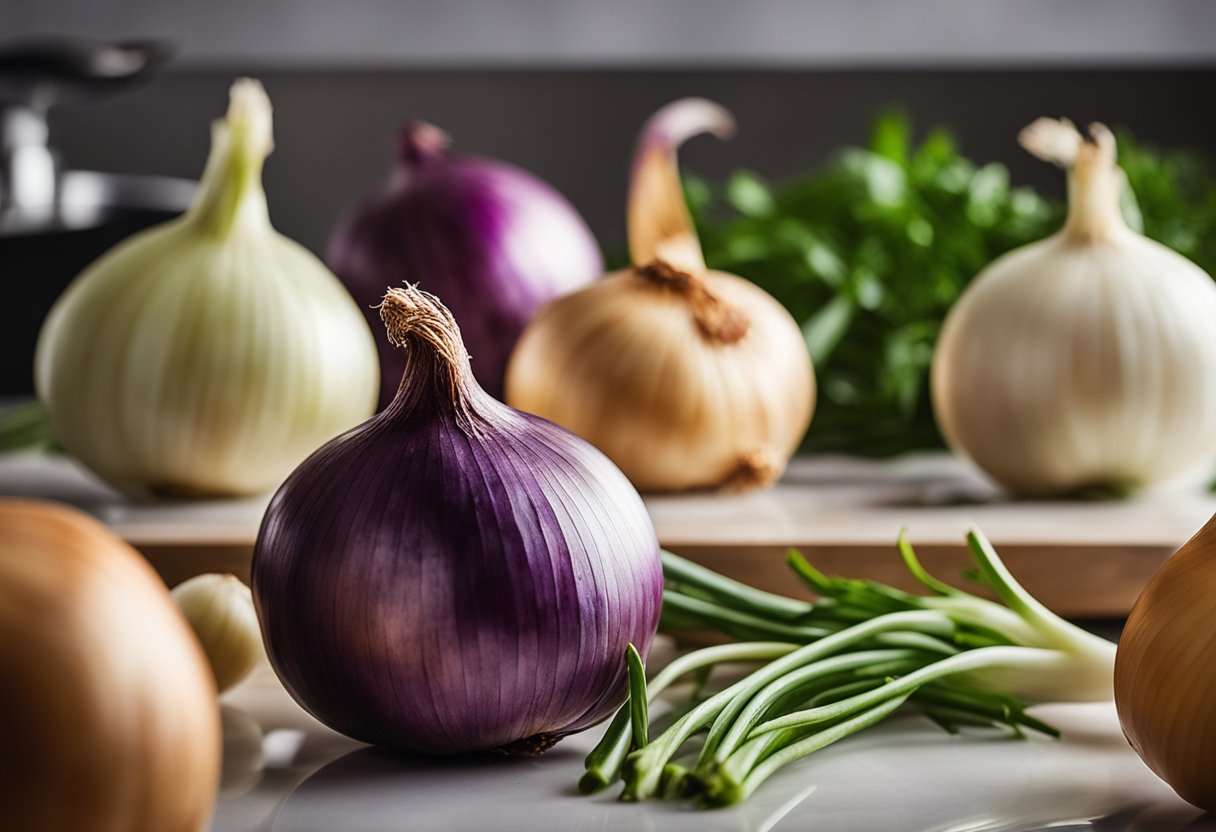
Understanding onions is the first step in determining how long they will last. Onions are a vegetable that comes in different varieties, including red, yellow, and white.
They have a papery outer layer and a fleshy inner layer that can be used in various dishes. The shelf life of onions can vary depending on their type, size, and how they are stored. Factors such as temperature, humidity, and exposure to light can also affect their shelf life.
Proper storage of onions is crucial to extending their shelf life. Onions should be stored in a cool, dry, and well-ventilated area.
The ideal temperature for storing onions is between 45 and 55 degrees Fahrenheit. Onions should not be stored in the refrigerator as the moisture can cause them to spoil faster. In the next section, I will discuss the signs of spoilage and when to discard onions.
Key Takeaways
- Onions can last up to three months when stored properly.
- Proper storage includes keeping onions in a cool, dry, and well-ventilated area.
- Signs of spoilage include mold, soft spots, and a foul odor.
Understanding Onions
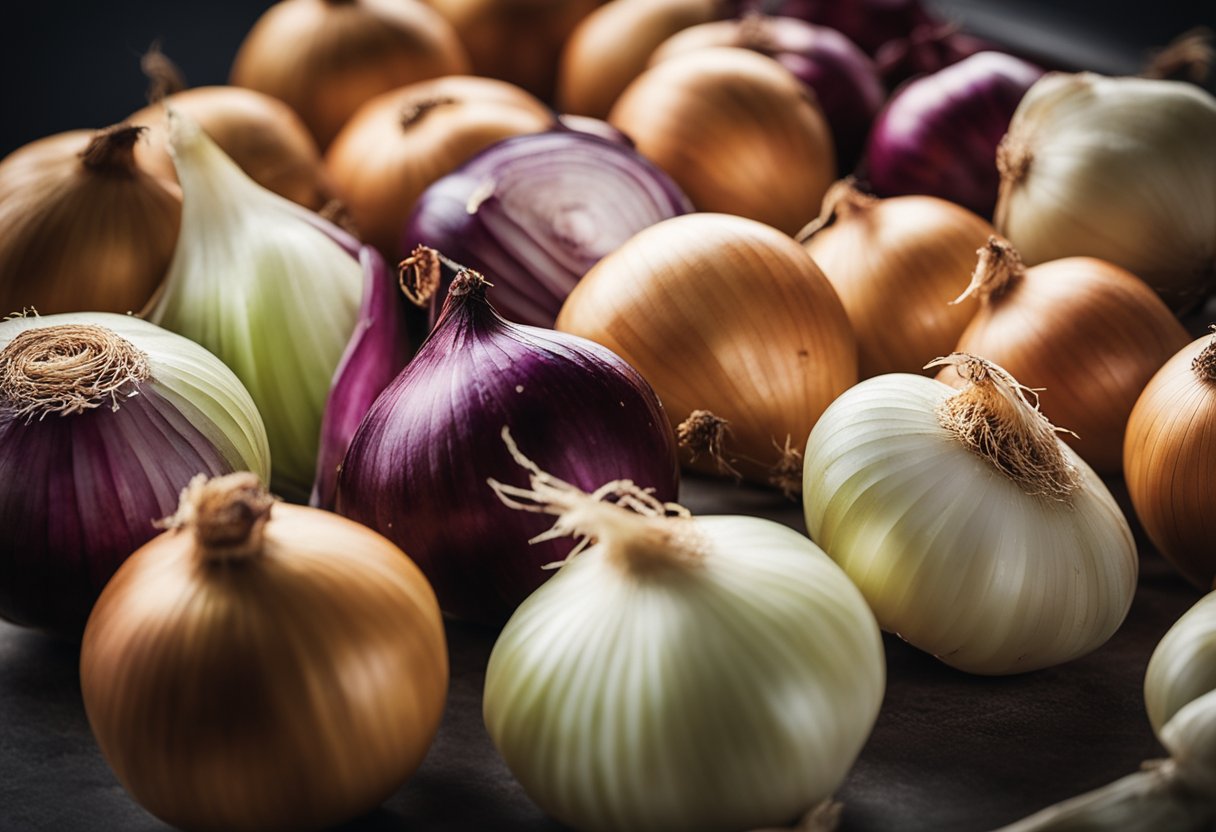
Onions are a bulbous vegetable that come in different varieties, including red onions, shallots, yellow onions, scallions, leeks, spring onions, green onions, and sweet onions. They are widely used in cooking to add flavor and depth to dishes.
The outer layer of an onion is a papery skin that helps protect the onion from moisture and air. This layer should be removed before using the onion.
The inside of an onion is made up of layers that are usually white or yellow in color, with a strong aroma that can make your eyes water when you cut into it.
The flavor of onions can vary depending on the type of onion. Red onions, for example, are often milder and sweeter than yellow onions. Sweet onions, on the other hand, are much milder and have a higher sugar content than other types of onions.
When it comes to shelf life, onions can last for several weeks to several months, depending on how they are stored. Whole, uncut onions can last for up to two months when stored in a cool, dry place like a pantry or cellar.
Cut onions have a shorter shelf life and can only last for seven to ten days when stored in the refrigerator. To extend the shelf life of cut onions, wrap the cut side in plastic wrap or aluminum foil before storing them in the refrigerator.
In summary, onions are a versatile and flavorful vegetable that can be used in a variety of dishes. Understanding the different types of onions and how to store them properly can help you get the most out of this kitchen staple.
Factors Affecting Onion Shelf Life
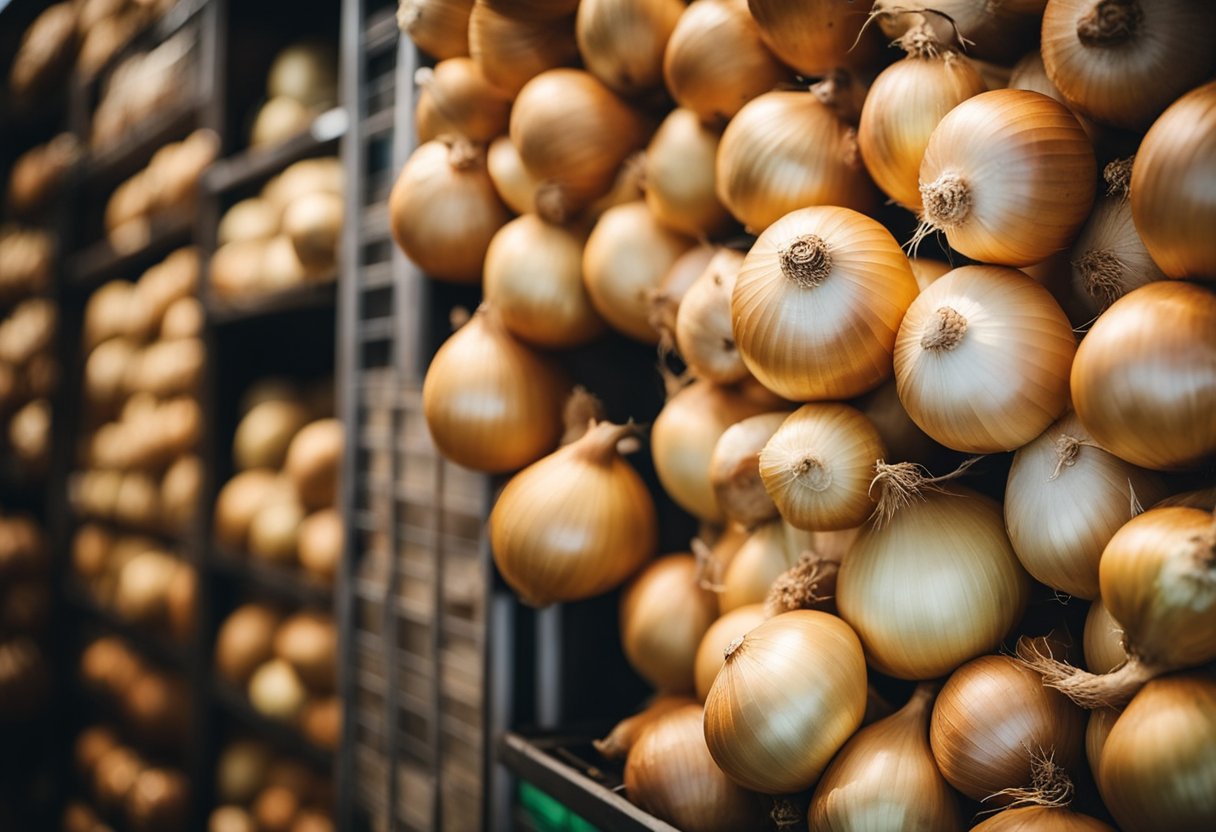
When it comes to the shelf life of onions, various factors can influence how long they last. In this section, I will discuss the most important factors that affect the shelf life of onions.
Temperature and Humidity
Temperature and humidity are two critical factors that can affect the shelf life of onions. Ideally, onions should be stored in a cool, dry place with a temperature range between 45 and 55 degrees Fahrenheit.
High humidity can cause onions to sprout or rot quickly, while low humidity can cause them to dry out. Therefore, it is essential to store onions in a location with optimum temperature and humidity conditions.
Storage Method
The storage method of onions can also affect their shelf life. Onions should be stored in a dry, ventilated area with good air circulation.
Avoid storing onions in plastic bags or sealed containers as they can trap moisture and promote spoilage. Instead, store onions in an open basket, mesh bag, or paper bag to allow air to circulate around them.
Onion Type and Condition
The type and condition of onions can also impact their shelf life. Red and yellow onions have a shorter shelf life than white onions due to their higher concentration of moisture and sugar.
Sweet onions have a shorter shelf life than other onions due to their high water content. Additionally, onions with sprouts or dark spots should be discarded as they are likely to spoil quickly.
Interactions with Other Foods
Onions can interact with other foods and affect their shelf life. For example, storing onions with potatoes can cause the potatoes to sprout quickly. Onions should be stored separately from other fruits and vegetables to avoid contamination and spoilage.
In summary, the shelf life of onions can be influenced by various factors, including temperature and humidity, storage method, onion type and condition, and interactions with other foods.
By following the proper storage techniques, you can extend the shelf life of your onions and enjoy their deliciousness for longer.
Proper Storage of Onions
When it comes to storing onions, there are a few things you need to keep in mind to ensure they last as long as possible. Proper storage of onions depends on whether they are whole, cut, cooked, or used in recipes.
Here are some tips for storing onions:
Whole Onions
Whole onions should be stored in a cool, dark place with good ventilation. A pantry, cellar, unheated basement, or garage are ideal places to store onions.
The temperature should be between 45 and 55 degrees Fahrenheit. Whole, raw onions can last up to two to three months when stored in a cool, dry place. Avoid storing onions near potatoes, as they can release moisture and cause onions to spoil faster.
If you buy onions in bulk, consider storing them in a mesh bag or a cardboard box with ventilation to promote air circulation. This will help prevent moisture buildup and keep the onions fresh for longer.
Cut or Peeled Onions
Once an onion is cut or peeled, it needs to be stored differently than a whole onion. Cut onions should be stored in an airtight container in the refrigerator. Alternatively, you can wrap them tightly in plastic wrap. Cut onions can last up to a week in the fridge.
Peeled onions should also be stored in an airtight container in the fridge. Peeled onions can last up to two weeks in the fridge.
Cooked Onions
Cooked onions can be stored in an airtight container in the fridge for up to four days. If you have leftover cooked onions, consider freezing them in an airtight container or a freezer bag. Cooked onions can last up to three months in the freezer.
Onions in Recipes
If you are using onions in a recipe, store them according to the recipe’s instructions. For example, if you are making soup or stew, you can store the leftovers in an airtight container in the fridge for up to four days or in the freezer for up to three months.
If you are using onions in a salad or sandwich, store the leftovers in an airtight container in the fridge for up to two days.
In conclusion, proper storage of onions is essential to keep them fresh and flavorful for as long as possible. Whether you are storing whole onions, cut or peeled onions, cooked onions, or onions in recipes, following these tips will help you make the most of your onions.
Signs of Spoilage and When to Discard Onions
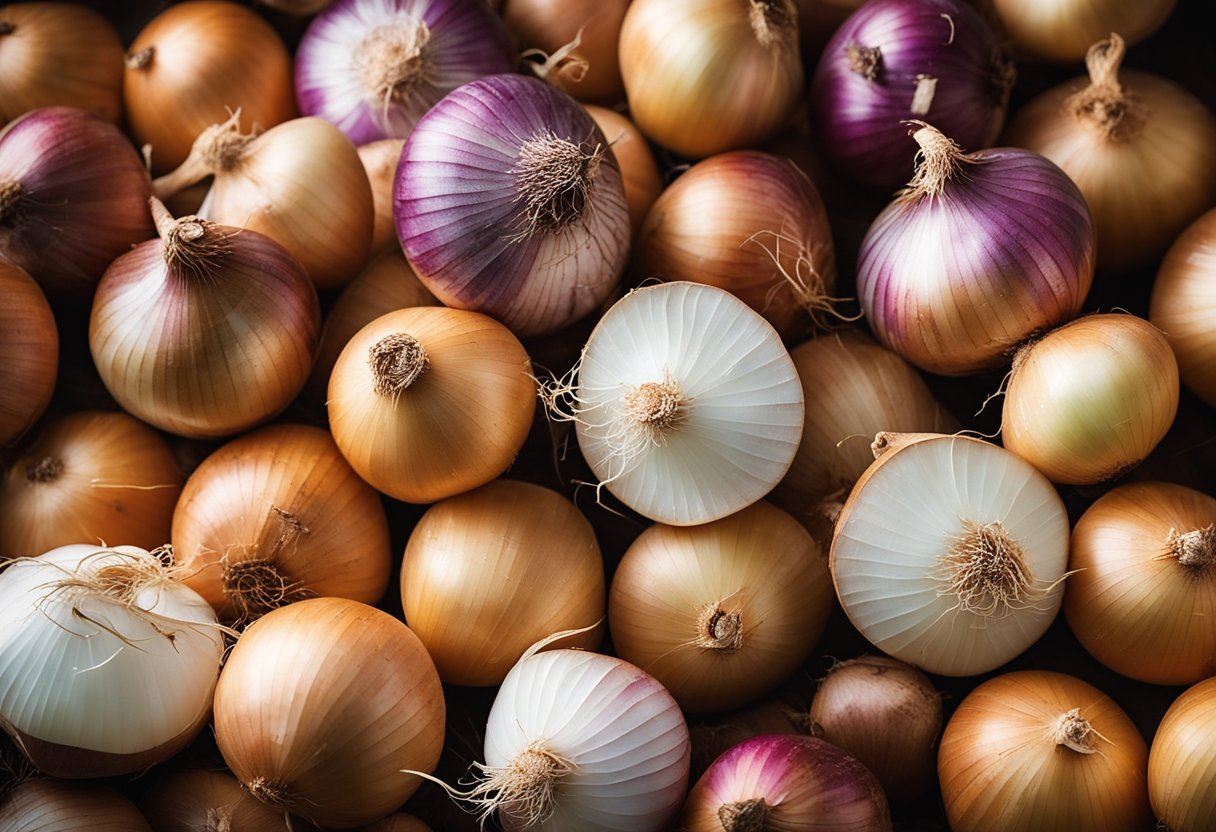
As onions age, they can start to show signs of spoilage. Knowing how to identify these signs can help you determine when it’s time to discard them.
One of the most common signs of spoilage is mold. If you notice any mold growing on your onions, it’s best to discard them immediately. Mold can spread quickly and can be harmful if ingested.
Another sign of spoilage is a change in texture. Onions that have gone bad may become soft or mushy. If your onions have lost their firmness and feel squishy to the touch, it’s time to throw them away.
Rot is another indication that your onions have gone bad. If you notice any dark spots or areas that are soft to the touch, it’s best to discard them. Rot can spread quickly and can make your onions unsafe to eat.
In addition to changes in texture, onions that have gone bad may also emit a foul smell. If your onions have a strong, unpleasant odor, it’s best to discard them. Onions should have a mild, slightly sweet aroma.
If you see any dark spots or areas that look like they’re starting to decay, it’s best to discard them. These spots can quickly spread and can make your onions unsafe to eat.
When it comes to discarding onions, it’s important to be mindful of composting. Onions that have gone bad can still be composted, but it’s important to make sure that they’re fully decomposed before using the compost in your garden.
Overall, it’s important to pay attention to the signs of spoilage when it comes to onions. By knowing what to look for, you can ensure that you’re only using fresh, safe onions in your cooking.
Common Myths and Facts about Onion Storage
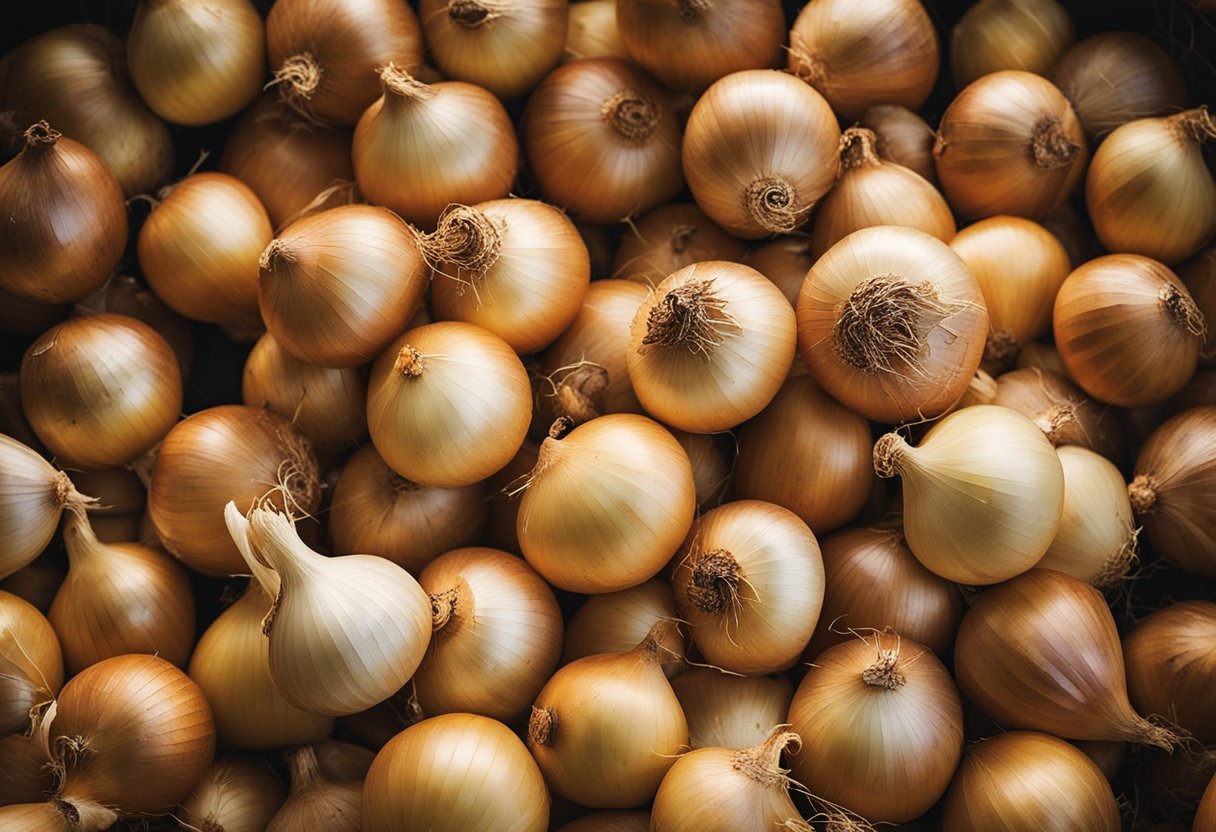
As someone who loves to cook with onions, I have heard many myths and rumors about how to store them properly. Here are some common myths and facts about onion storage that I have found through my research.
Myth: Onions should be stored in the refrigerator.
While it might seem like a good idea to keep onions in the refrigerator to make them last longer, this is actually a myth.
According to the National Onion Association, onions should be stored in a cool, dry, well-ventilated place, such as a pantry or cellar. Storing onions in the refrigerator can actually cause them to become soft and moldy.
Fact: Onions can last longer if stored properly.
Onions can last for several weeks if stored properly. To maximize their shelf life, it’s important to keep them dry and prevent exposure to excess moisture. This means avoiding storing onions in plastic bags or containers, which can trap in moisture and cause them to spoil faster.
Myth: Onions can absorb moisture from other foods.
While it’s true that onions can absorb moisture from other foods, this is not necessarily a bad thing. In fact, onions can help keep other foods fresh by absorbing excess moisture.
However, it’s still important to store onions separately from other foods to prevent them from spoiling.
Fact: Proper storage can help prevent spoilage.
Proper storage is key to preventing onions from spoiling. This means storing them in a cool, dry, well-ventilated place, and avoiding exposure to excess moisture. It’s also important to inspect onions regularly for signs of spoilage, such as soft spots or mold.
Study: The best way to store onions.
A study conducted by the University of California, Davis found that the best way to store onions is in a cool, dry, well-ventilated place, such as a pantry or cellar.
Onions stored in this way were found to last for up to eight weeks, while onions stored in the refrigerator or in plastic bags only lasted for a few days.
In conclusion, proper storage is essential for keeping onions fresh and preventing spoilage. By following these tips, you can ensure that your onions last longer and stay fresh for all your cooking needs.
Conclusion
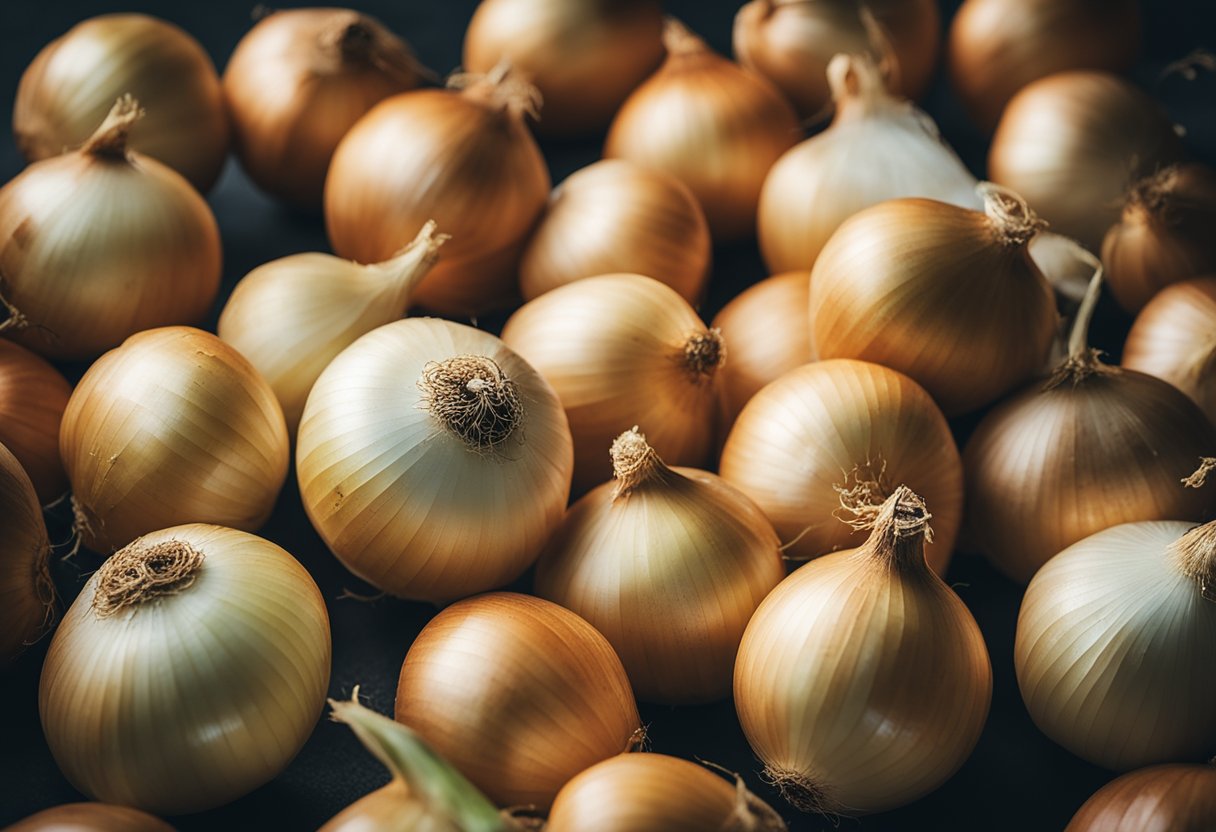
In conclusion, onions can last anywhere from a few days to several months depending on how they are stored.
Whole, raw onions will last two to three months when stored in a cool, dry place like a cellar, pantry, unheated basement, or garage. Yellow onions, for example, can last up to 2-3 months when stored in a cool, dry place.
If you don’t have access to a cool, dry place, you can store onions in the refrigerator. Whole fresh onions can last for 4-6 weeks on the counter or 1-2 months in the refrigerator.
Scallions or spring onions can last for 1-2 days on the counter but they can last for 1-2 weeks if you put them in the fridge. Shallots last up to two months in the refrigerator, and around four to six weeks unrefrigerated.
It’s important to note that onions should be stored away from potatoes, as they can cause each other to spoil faster. Additionally, once an onion has been cut, it should be stored in the refrigerator and used within a few days.
Overall, storing onions properly can help extend their shelf life and reduce food waste. By keeping them in a cool, dry place or in the refrigerator, you can ensure that your onions will last for as long as possible.
Related posts:
Frequently Asked Questions
How can I store cut onions in the fridge?
If you have leftover cut onions, store them in an airtight container in the fridge. It’s best to use them within a day or two to prevent spoilage.
How long can red onions last in the fridge once cut?
Red onions, like other types of onions, can last up to a week in the fridge once cut, as long as they are stored properly in an airtight container.
What’s the best way to store onions for long periods, such as 6 months?
The best way to store onions for long periods is to keep them in a cool, dry, and dark place with good ventilation. Ideally, the temperature should be between 45 and 55 degrees Fahrenheit. A pantry, cellar, or unheated basement are all good options.
What are the best methods for preserving onions for several months?
One of the best methods for preserving onions for several months is to dehydrate them. You can do this by slicing them thinly and drying them in a dehydrator or in the oven at a low temperature.
Another method is to freeze onions, either chopped or whole, in an airtight container or freezer bag.
Can peeled onions be safely stored in the fridge?
Peeled onions can be stored in the fridge for up to two weeks as long as they are kept in an airtight container. However, it’s best to use them within a few days to ensure freshness.
How can I keep onions fresh after cutting them?
To keep onions fresh after cutting them, store them in an airtight container in the fridge. You can also sprinkle a bit of lemon juice or vinegar on them to help preserve their freshness. However, it’s best to use them within a day or two to prevent spoilage.







